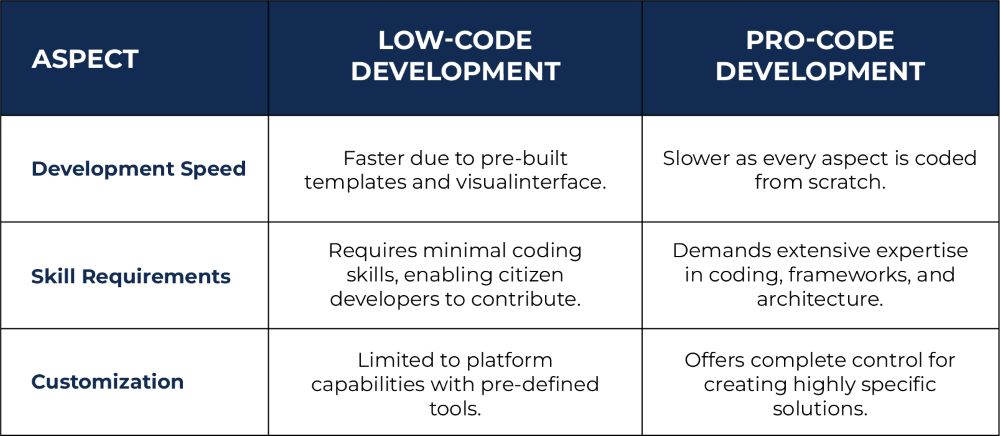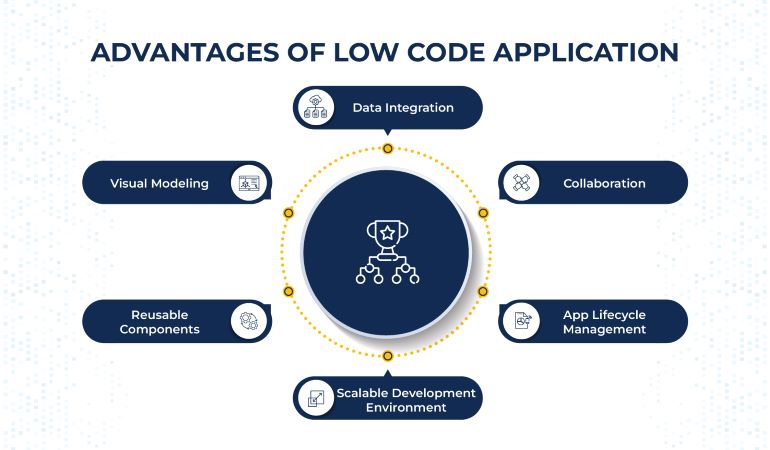Traditionally, businesses had only two options for application development: buy off-the-shelf apps or go for custom application development. However, that is changing with the growing advancements in low-code application development.
The low-code application market is expected to reach $44.5 billion by 2026. So, what drives the interest in low-code apps?
This article briefly explains low code development, its features, and why it is gaining popularity.
What is Low Code Application Development?
Low code, as the name implies, is a software development approach that entails little (low) or no code to build applications. It also deviates from the traditional mobile app development processes in that it employs a model-driven environment with a drag-and-drop interface.
As a result, low code application development platforms (LCAP) use visual interfaces instead of challenging programming languages, enabling developers to build simple and complex applications through a graphical interface. Low code no code development requires little technical expertise, thus enabling faster time-to-market.
On the other hand, the traditional development approach is high code as it involves manually coding in various languages with multiple technologies. It’s true that you can build incredible applications with a high code approach, but you will always require proper IT specialists and programmers to do it. Low code no code eliminates that requirement.
Difference Between Low-Code and Pro-Code
Traditional code, also known as pro-code, is what people usually think of when it comes to software development. It is the traditional process of writing programming code line-by-line.
Here are some of the key differences between low-code and pro-code:

-
Development Speed
Low-code application development is significantly faster due to pre-built templates and visual interfaces. Pro-Code slows down development as every aspect of the application has to be coded from scratch.
-
Skill Requirements
Traditional development requires extensive coding knowledge. Developers need expertise in programming languages, frameworks, and software architecture.
In contrast, low-code application development needs minimal coding skills. It enables even non-tech users or citizen developers to contribute to the development process.
-
Customization
Traditional developers have full control over their development environment. They can customize every aspect of the app to create highly specific solutions. On the other hand, low code is constrained by the platform’s capabilities and pre-defined tools.
Low-Code vs. No-Code
Low-code and no-code both use graphical interfaces to automate and create software applications, but they are not the same. Their main difference lies in the level of coding expertise.
A low-code app development environment is designed for users with certain expertise, development needs, and target audiences.
Here are the main characteristics that differentiate low-code from no-code:
-
Target Users
Low-code application development is geared toward developers or individuals who have some coding knowledge. It offers tools to speed up development but still requires basic coding for advanced operations.
On the other hand, no-code apps are designed for users with no technical background. They are mostly used by business users that require applications without writing any code.
-
Flexibility
Low-code applications provide more flexibility and customization options. Some advanced low-code platforms provide almost the same features as traditional programming.
No-code is limited to pre-built templates that restrict customization options.
-
Complexity
No-code is suitable for simple apps that need to perform elementary operations, such as forms or workflow automation.
Low code is suitable for building complex, enterprise-level applications that often require integrations with APIs.
-
Scalability
Low-code apps are more scalable and can handle large volumes of data.
However, no-code apps are less scalable and may not support high user loads.
Features and Advantages of Low Code Application
Here are the top advantages and features of low-code applications;

-
Visual Modeling
The drag-and-drop feature, coupled with an intuitive user interface, enables skilled developers to enhance their productivity. It also allows people with no coding background to develop applications. Moreover, since it is model-driven development, you can easily see how the application works as you build it.
Here are some advantages you get from low code:
- Leverage resources and talent to create and deploy applications faster
- Enable non-IT teams and departments to take part in the development process
- Build a range of solutions without high costs
- Effective collaboration
- Improved decision-making between cross-functional teams
- Use your developers to work on more complex tasks.
-
Reusable Components
You can use the low code app development approach to build scalable cross-platform apps in no time using pre-configured modules, connectors, templates, logic, etc. Moreover, professional developers can extend and customize the components of a low-code app.
Here are some more benefits of low code development:
- Improved efficiency leading to faster development
- Use reusable components already tested for security and performance
- Consistent and scalable application development
- Customize or enhance app features quickly and easily
-
Collaboration
Low-code application development platforms offer built-in tools that enable collaboration. These tools provide revision tracking, messaging, feedback loops, and much more. Moreover, as low code development is visual in nature, it allows every team member to be on the same page, using the same language as others.
Some key benefits include the following:
- Eliminates silos to encourage and facilitate collaboration between IT and business teams
- Improves organization-wide communication
- Streamlines the development process
- Reduces rework
-
Scalable Development Environment
Market dynamics and customer demands change very quickly in today’s fast-paced business environment. Low code development lets you respond to these changes in no time by allowing you to augment existing applications and build and deploy new ones.
Moreover, a cloud-based LCAP gives you flexibility and offers support for continuous development. It also enables you to scale your run-time and dev-time on demand.
Here are some benefits you can expect from cloud-based LCAPs:
- Create manageable solutions that are easily scalable on cloud-native architectures
- Make changes immediately if and when necessary
- Deliver enhanced user experience (UX) through mobile, web, immersive, or conversational engagement
- Handle disruptions without fear by making your company agile
-
Data Integration
Low code, no code platforms help you securely integrate your data with legacy systems and other sources or systems. You can use pre-configured connectors and APIs to build applications. Moreover, you can also enable your professional developer to create a custom integration.
Here are some advantages you would want to know about:
- Save 30 percent of your development time
- Build and manage systems at scale
- Seamless data discovery and sharing across teams and projects
- Build microservices and reusable parts by effortlessly accessing company databases
-
Application Lifecycle Management
Low code development platforms give you the tools and capabilities to manage all the phases of your application development lifecycle. These features include version control, requirements management, testing, deployment, etc. They also help you streamline your project management.
Moreover, good low-code development platforms employ agile methodology, practices, and DevOps tools.
You can expect the following benefits from a comprehensive low-code app development platform:
- Manage all the phases of your app’s lifecycle – ideation, development, testing, deployment, after-sales, etc. – from a single platform
- Leverage automation and abstraction to fast-track each phase of the lifecycle
- Enable autonomous and iterative teams
Why is Low-Code Development Becoming So Popular?
As rivalries increase between organizations, companies seek to develop core competencies that give them a competitive edge. Faster software development is one such competency; it is crucial for tech companies to build and deploy applications faster than ever before.
Traditional app development is time-consuming and costly. It takes hours upon hours for developers to build high-performing customized apps. Why? Because they have to write the code to develop these apps. And they write these codes using complex programming languages.
But when you switch to low-code application development, you don’t require as much time. In fact, you write little to no code to build an app. Thus, it reduces the app development time from months to a few days or weeks.
As a result of the time-consuming nature of high-code development, low-code app development seems like the best option for companies to develop and market applications aimed at solving business problems. It enables your developers to focus on building better software than spending hours writing code or doing repetitive tasks that can be automated.
Here are some reasons why low-code app development is becoming the go-to choice for enterprise applications and developers alike.
- Saves costs
- Faster application development
- Non-IT teams’ participation in app development
- Automates repetitive and time-consuming tasks
- Enables scalability and agility
Who Should Use Low-Code Applications?
Low-code applications are beneficial for a number of users, including:
-
Project Managers
IT project managers can use low code to expedite the development process. Without the need to write code for everything, managers can deliver projects faster.
-
Business Managers
Business managers don’t have much time for technical details of the development process. Low code allows them to create organization-level apps with minimal technical input.
-
Professional Developers
Low-code platforms aren’t just for non-technical users. Professional developers can use it to automate repetitive tasks during coding. Additionally, developers can use pre-built templates to improve code quality.
-
Enterprise Developers
Enterprise developers need to create complex apps for big businesses, which is a very time-intensive process. Low-code can help them with its prebuilt templates to solve some of the complexities of enterprise-level development.
Conclusion
No code low code development platforms are transforming the application development industry. As agility and scalability become high-priority goals for companies, many are switching to the low code no code development approach.
It wouldn’t be far-fetched to say that one day, these no code low code development platforms will largely replace developers. However, developers would still be required to develop complex, customized applications. You would also need developers to enhance and optimize existing apps.
Nevertheless, switching to low-code development offers immense benefits to companies; thus, we will see the trend of low-code apps growing stronger in the coming years.
Are you looking to use low-code application development platforms to build apps?
Contact us at [email protected] to book a FREE session to discuss how Xavor can help you achieve your goals.

